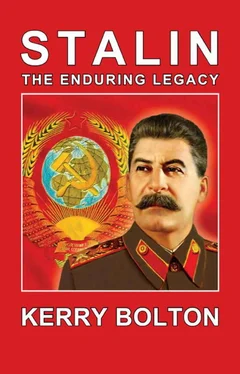Despite what appears to have been Khrushchev’s role in Stalin’s death, and his famous repudiation of Stalinism, under his leadership the Soviet bloc did not succumb by radically deviating from Stalin’s path in the way Beria sought. The Soviet bloc remained the main obstacle to American-plutocratic hegemony until succumbing to pressures from within and without. While we today live under a de facto one-world government, if it had not been for Stalin’s obstructionism we would likely have succumbed to a de jure one-world state over six decades previously.
VII
The USSR After Stalin’s Death
Despite what appears to be Khrushchev’s complicity in the death of Stalin, possibly because of little or no options in the face of Beria’s power, Beria’s succession to leadership was very short-lived. Khrushchev with his secret address to the Twentieth Congress of the Communist Party of the Soviet Union in 1956 seemed to be about to embark on a new course and he is generally credited with the ‘de-Stalinization’ of the Soviet bloc. Yet, until the assumption of Mikhail Gorbachev, the Soviet bloc, especially spanning the regimes from Khrushchev to Brezhnev, remained as nationalistically intransigent toward US globalism and cultural decay as it was under Stalin. Also notable was the Soviet bloc’s continued opposition to Israel and to World Zionism.
Soviet Origins of Anti-Zionism
There had always been a conflict between Zionist Jews and secularist Jews in the socialist movements throughout the world. Secularist or ‘apostate’ Jews believed that the best means of combating ‘anti-Semitism’ was for Jews to abandon their separate ethnic identity and assimilate into a new world socialist society. Zionists to the contrary regarded assimilation as ethnic suicide and held that anti-Semitism could never be eliminated from Gentile societies. Their best course was therefore to separate. Into this mix there was an influential element that combined Zionism and socialism. Moses Hess, who had an early influence on Karl Marx, was a leading proponent of both Zionism and Socialism [425] Shlomo Avineri, Moses Hess: Prophet of Communism and Zionism (New York University, 1985).
.
However, Karl Marx was a secularist Jew who was antagonistic towards what he considered to be the ‘Jewish spirit’ in capitalism. Given his own money-grubbing mentality, this might have been no more than psychological project. Nonetheless, he believed that Jews needed ‘emancipating’ from their preoccupation with money, writing:
Money is the jealous god of Israel, in face of which no other god may exist. … The god of the Jews has become secularized and has become the god of the world. The bill of exchange is the real god of the Jew. His god is only an illusory bill of exchange. The chimerical nationality of the Jew is the nationality of the merchant, of the man of money in general. What is the secular basis of Judaism? Practical need, self-interest. What is the worldly religion of the Jew? Huckstering. What is his worldly God? Money. Very well then! Emancipation from huckstering and money, consequently from practical, real Judaism, would be the self-emancipation of our time [426] Karl Marx, On the Jewish Question, 1844. www.marxists.org/archive/marx/works/1844/jewish-question/
.
Antagonism towards Jew was of long duration in Russia [427] Walter Laqueur, The Black Hundred: The Rise of the Extreme Right in Russia, (New York: Harper Perennial, 1993).
and was the primary reason why so many Jews entered the revolutionary movements to overthrow the Czar. Russian anti-Semitism manifested organisationally in The Black Hundred who opposed capitalism as much as socialism, and perceived them as equally Jewish [428] Ibid.
.
Stalin, in his fight for leadership, was up against a large number of veteran Jewish Bolsheviks, Trotsky being the principal enemy, as we have seen. Although originally supporting the creation of the State of Israel in 1948, this was primarily a means by which the USSR could destabilise the Middle East and head-off Anglo-American and other rival influences in the region. It was a matter of realpolitik, of which Stalin was a master, not sympathy towards Zionism. The question of the loyalty of Jews in the USSR and wider Soviet bloc after World War II became a further factor in Stalin’s antagonism towards Jewish interests, as their loyalties were divided with the establishment of Israel. Hence, in Stalinism the old Czarist suspicion of Jews was revived as a State policy with a justification that Marx himself had condemned the ‘Jewish spirit’ of capitalism and that there had been a conflict of interests, even among Jews themselves, between Zionism, Socialism and Socialist-Zionism going back to before the 1917 Bolshevik Revolution.
Winston S Churchill referred to this in 1920 in the aftermath of the Bolshevik Revolution, as a ‘struggle for the soul of the Jewish people’ [429] Winston Churchill, ‘Zionism versus Bolshevism: a struggle for the soul of the Jewish people’, London: Illustrated Sunday Herald, February 8, 1920, 5.
. In writing of Chaim Weizmann, who became first President to Israel, Laurence Krane states of this:
…Some Jews felt that the savior of the Jews would come through political reform such as communism or socialism. Others argued that assimilation would answer the problem of anti-Semitism and ease the economic hardships of the Jew. Still others maintained that immigration to Palestine, as Israel was called then, and by building up settlements in the Land would save the Jews from economic privation and exploitation [430] Laurence Krane, ‘Chaim Weizmann, Builder of Israel’, The Jewish Magazine, October 2002, http://74.125.155.132/search?q=cache:iZ0Sh9qb5vkJ:www.jewishmag.com/60mag/weizmann/weizmann.htm
.
As in Czarist Russia, in the Soviet bloc from the time of Stalin, Jews via Zionism were again seen as subversives aligned with Israel and the capitalist powers. The USSR henceforth became a centre of resistance to Zionism, which was described with Marxist rhetoric as an agent of imperialism. Much effort was expended in exposing the character of Zionism not simply as the doctrine of the Israeli State, but as having worldwide ramifications.
One representative example is entitled Zionism: Instrument of Imperialist Reaction, published in 1970 [431] I Braginsky, et al., Zionism: Instrument of Imperialist Reaction, (Moscow: Novosti Press Agency Publishing House, 1970).
. The book is a collection of letters of protest against Zionism and Israel written to the Soviet press, mainly by Soviet Jews, and a selection of articles by various writers that had been published in the Soviet press. For example, Prof. Braginsky’s article ‘ The Class Essence of Zionism ’, originally published in Pravda , [432] I Bragnaski, ibid., ‘The Class Essence of Zionism’.
drew on Marxist and Leninist thinking in regard to Jewish autonomy, stating that Jewish assimilation is the ‘historically progressive process’, alluding to Marx’s position on the issue, and quoting Lenin. [433] I Braginksy,ibid., 84.
In late 1951 Rudolf Slansky, Secretary General of the Communist Party in Czechoslovakia was arrested for ‘anti-state activities’. A year later he and thirteen co-defendants went on trial as ‘Trotskyite-Titoist-Zionist traitors’. It is interesting that Trotskyite and Zionist were used in conjunction. They were accused of espionage and economic sabotage, working on behalf of Yugoslavia, Israel and the West. Eleven of the fourteen were sentenced to death, the other three to life imprisonment. Slansk, et al were hanged on 3 December, 1952. Of the fourteen defendants, eleven were Jews, and were identified as such in the indictment. Many other Jews were mentioned as co-conspirators. They were implicated in a cabal that included US Supreme Court Justice Frankfurter, an influential Zionist politico, described as a ‘Jewish nationalist’ in the Czechoslovak indictment, and Mosha Pijade the ‘Titoist Jewish ideologist’ in Tito’s Yugoslavia, that had broken with the Soviet bloc.
Читать дальше












